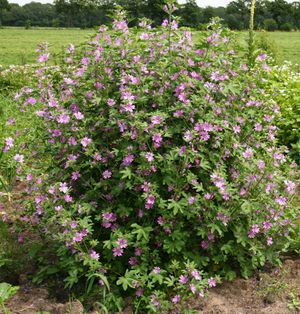Difference between revisions of "Malva sylvestris"
(Created page with "{{taxobox |name = ''x'' |image = Common x.jpg |image_caption = ''xfoxglove'' | regnum = Plantae |ordo = x |familia = x |genus = x |species = '''''x'''''...") |
(→Uses) |
||
| (4 intermediate revisions by the same user not shown) | |||
| Line 1: | Line 1: | ||
{{taxobox | {{taxobox | ||
| − | |name = '' | + | |name = ''Malva sylvestris'' |
| − | |image = | + | |image = Garden 120702 (15).JPG |
| − | |image_caption = '' | + | |image_caption = ''Malva sylvestris growing wild in my garden'' |
| regnum = [[Plantae]] | | regnum = [[Plantae]] | ||
| − | |ordo = [[ | + | |ordo = [[Malvales]] |
| − | |familia = [[ | + | |familia = [[ Malvaceae]] |
| − | |genus = [[ | + | |subfamilia = [[Malvoideae]] |
| − | |species = ''''' | + | |genus = [[Malva]] |
| − | |}}<br clear="all"/> | + | |species = ''''' M. sylvestris''''' |
| + | |binomial = ''Malva sylvestris'' | ||
| + | |}} | ||
| + | Malva sylvestris is a species of the Mallow genus Malva and is considered to be the typical for this genus. It is also known as '''common mallow''', '''high mallow''' and '''tall mallow'''. It is a healthy plant that can grow three or four feet high freely in fields and in hedgerows. The genus is widespread in Africa and Eurasia and the plants are considered weeds in North and South America where they do not occur naturally but act as an invasive type. | ||
| + | |||
| + | == Uses == | ||
| + | [[File:Malva sylvestris - Köhler–s Medizinal-Pflanzen-222.jpg|thumb|250px|left|Malva sylvestris]] | ||
| + | The boiled young leaves are a wholesome vegetable and was eaten in several parts of Europe, however cattle do not seem to enjoy it and graze around them. | ||
| + | |||
| + | The plant has a long history as a medicinal herb. Its ancient Latin name 'Herba Omniumorbium' (herb for all diseases) refers to this. | ||
| + | |||
| + | Tea of the leaves and flowers can be used for inflammation of the mouth and throat. A decoction of the flowers (two hands full with flowers in 1 liter of water, boil two to three minutes) can be used to bathe sores and infected skin. | ||
| + | |||
| + | The plant contains essential oils, vitamin A, vitamin C, vitamin B1, vitamin B2 and carotene.<br clear="all"/> | ||
== Garden Journal == | == Garden Journal == | ||
| Line 18: | Line 31: | ||
== External links == | == External links == | ||
| − | * | + | * [http://botanical.com/botanical/mgmh/m/mallow07.html Mallow] Mrs. Grieve, A Modern Herbal |
| − | + | * [http://en.wikipedia.org/wiki/Malva_sylvestris Malva sylvestris] Wikipedia | |
| − | |||
==Comments== | ==Comments== | ||
Latest revision as of 06:37, 5 July 2012
| Malva sylvestris | |
|---|---|

| |
| Malva sylvestris growing wild in my garden | |
| Scientific classification | |
| Kingdom: | Plantae |
| Order: | Malvales |
| Family: | Malvaceae |
| Subfamily: | Malvoideae |
| Genus: | Malva |
| Species: | M. sylvestris |
| Binomial name | |
| Malva sylvestris | |
Malva sylvestris is a species of the Mallow genus Malva and is considered to be the typical for this genus. It is also known as common mallow, high mallow and tall mallow. It is a healthy plant that can grow three or four feet high freely in fields and in hedgerows. The genus is widespread in Africa and Eurasia and the plants are considered weeds in North and South America where they do not occur naturally but act as an invasive type.
Uses
The boiled young leaves are a wholesome vegetable and was eaten in several parts of Europe, however cattle do not seem to enjoy it and graze around them.
The plant has a long history as a medicinal herb. Its ancient Latin name 'Herba Omniumorbium' (herb for all diseases) refers to this.
Tea of the leaves and flowers can be used for inflammation of the mouth and throat. A decoction of the flowers (two hands full with flowers in 1 liter of water, boil two to three minutes) can be used to bathe sores and infected skin.
The plant contains essential oils, vitamin A, vitamin C, vitamin B1, vitamin B2 and carotene.
Garden Journal
- See also Garden Journal for a list with all plants with a garden journal section.
See also
External links
- Mallow Mrs. Grieve, A Modern Herbal
- Malva sylvestris Wikipedia
Comments
: You need to be logged into your Facebook account to post comments

